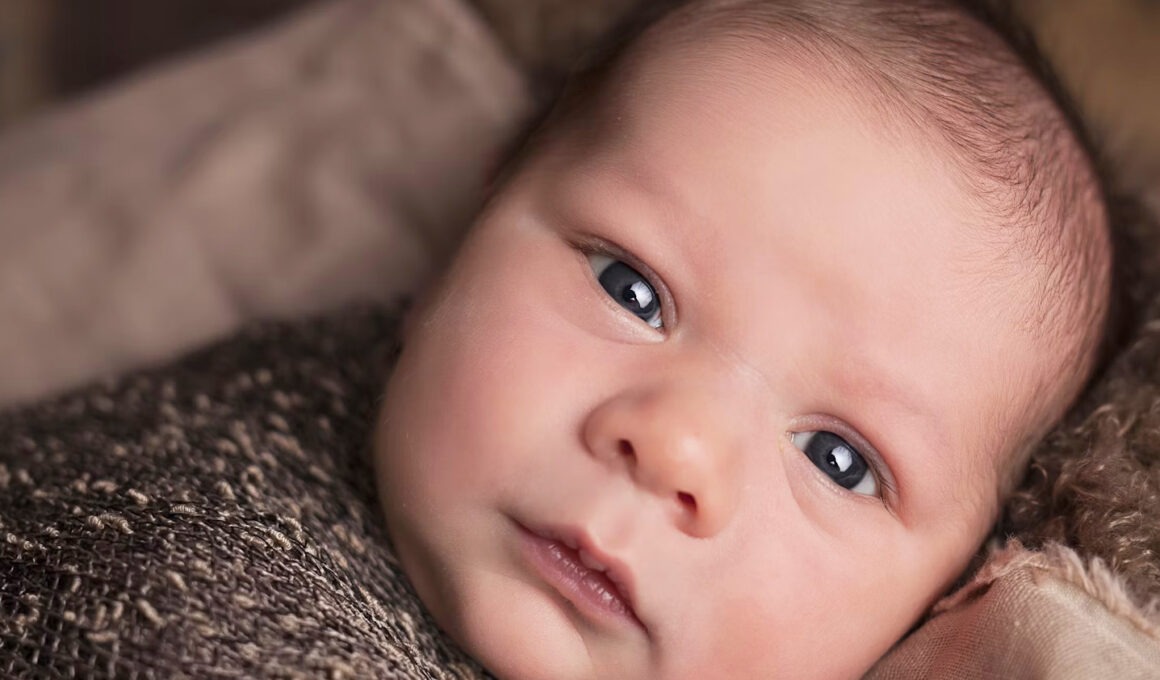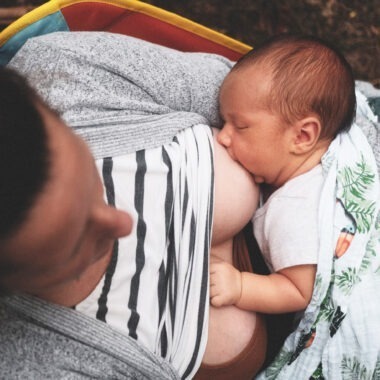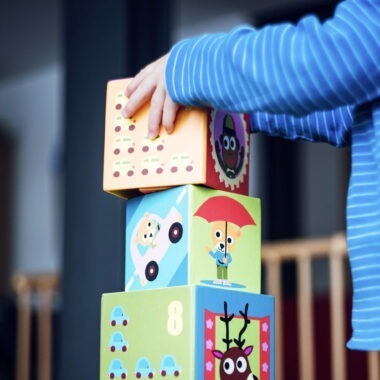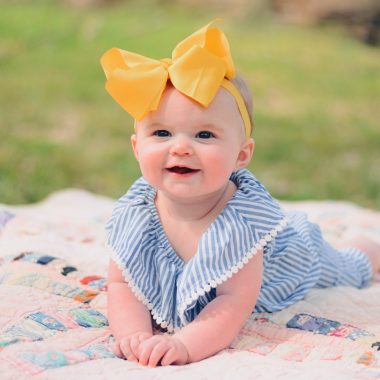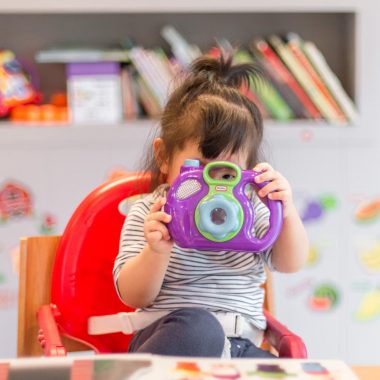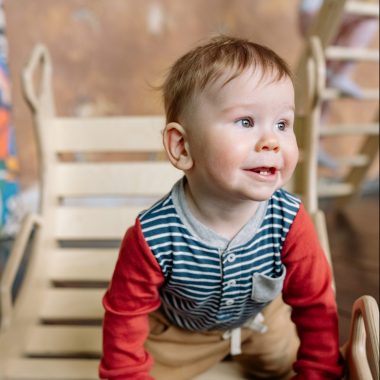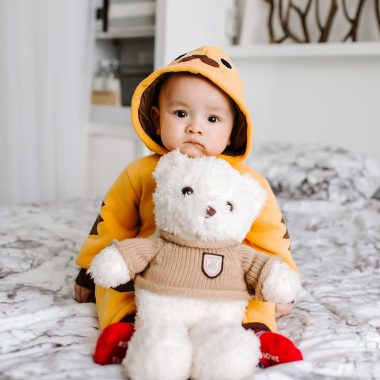If you’ve ever caught your baby staring you down or intently locking eyes with everyday objects and people around them, you must have wondered what that was about. A lot of times it appears as if your child is lost in thought or, quite frankly, ready to square up. But in truth, what you might actually be dealing with is an observant baby.
And here’s where things get interesting. If you have an observant baby on your hands, chances are your child might be gifted. A high level of alertness is usually attributed to intelligence.
READ MORE: Signs Of Intelligence In Babies
In this article, we will discuss what it means to have an observant baby and how they develop and grow with the world around them.
What is an Observant Baby?
If you ever notice your baby with their eyes glued to everything around them, that’s an observant baby for you! Observant babies tend to be naturally curious and attentively watch every movement and sound. Seeing how everything is brand new for babies, they are always trying to figure out the world around them.
From tracking moving objects with their eyes to turning their head at the slightest new sound, an observant baby is always tuned in. You might also spot them staring at people during conversations, soaking in facial expressions, and interactions.
Does your baby seem extra curious about their environment? If so, you might have your very own little observer in the making!
Cognitive Development
Observant babies tend to learn by watching the world around them. This is called observational learning, where they absorb information simply by observing how others act and interact. From watching a parent stack blocks to noticing how a toy works, babies pick up valuable lessons without direct teaching. This method of learning is an important foundation for cognitive development, as babies process what they see and begin to understand cause-and-effect relationships.
Observation also plays a key role in the development of problem-solving skills. As babies watch their environment, they start figuring out how things work. Whether it’s seeing how to reach for a toy just out of grasp or watching someone solve a puzzle, observant babies often use these insights to solve problems on their own. This ability to assess and interact with their surroundings helps build critical thinking and decision-making skills early on.
Signs of Cognitive Development in Observant Babies
Observant babies often hit cognitive milestones earlier due to their heightened awareness. Here are a few signs that indicate advanced cognitive development in an observant baby:
- Early Understanding of Cause and Effect: They quickly catch on that pressing buttons, opening lids, or stacking objects lead to specific results.
- Engaging in Complex Play: You might notice your baby trying to solve more complex puzzles or interact with toys in ways that demonstrate planning and foresight.
- Watching and Then Doing: An observant baby will often sit back and watch how something is done before attempting it themselves. They assess situations and wait for the right moment to act, instead of diving in without a plan.
ALSO READ: Top 5 Therapy Options for Children with Intellectual & Developmental Disabilities
Social and Emotional Insights
Babies are constantly learning from the people and world around them, but observant babies have a special knack for picking up on social cues and emotional dynamics from an early age. These insights play a crucial role in their ability to understand relationships and manage their own emotions as they grow.
One key trait of an observant baby is their ability to closely watch how people interact. From a young age, these babies often keenly observe the expressions, body language, and tone of voice used by those around them. This awareness helps them begin to grasp the basics of social interactions.
Research shows that babies as young as 6 months can already differentiate between happy, sad, and angry expressions, and observant babies tend to develop this skill even earlier. By simply watching how adults and other children communicate, they start to learn the “rules” of interaction.
As they grow, this helps babies:
- Form strong relationships and bonds with caregivers and peers
- Improve communication skills as they model what they see in their environment
- Empathize better as they become attuned to how others feel
Another fascinating aspect of observant babies is their ability to regulate their emotions. Because they’re constantly watching the social dynamics around them, they can begin to understand how emotions work—not only in others but in themselves as well. Emotional regulation is the ability to manage and respond to emotional experiences in a healthy way, and observant babies seem to start grasping this skill earlier than others.
Studies show that babies who are better at understanding emotions tend to have stronger emotional regulation skills later in life.
Emotional regulation at an early age:
- Leads to fewer temper tantrums and emotional outbursts.
- Contributes to better mental health and emotional well-being.
- Develop stronger coping skills and allows for better adaption to new or stressful situations.
Signs of Emotional Awareness in Observant Babies
If you’re wondering how to spot these social and emotional insights in your baby, here are a few indicators that your little one may be particularly observant in this area:
- Eye Contact: They make frequent and focused eye contact, often watching facial expressions closely .
- Mimicking Behavior: Your baby starts to mirror your expressions, like smiling when you smile or frowning when you appear upset.
- Soothing Themselves: They might calm themselves down more easily after brief emotional distress by sucking their thumb, holding a favorite toy, or using a comforting gesture they’ve seen others do.
- Interest in People: They show a strong curiosity about other people’s actions and seem more engaged when watching social interactions, even between strangers.
ALSO READ: How To Spot Medical Complexities In Children?
Language Acquisition
Language development is a major milestone for every baby, and observant babies have a special edge when it comes to picking up on language patterns. They are often more attuned to the sounds, rhythms, and context of conversations happening around them, which significantly boosts their ability to communicate.
There are two main ways that observant babies use to acquire language: mimicking speech patterns and contextual learning. Around 6-12 months, many observant babies will start imitating basic sounds like “da-da” or “ma-ma,” and from there, their vocabulary can grow rapidly. The more they observe how adults use language, the more likely they are to try to replicate it.
Research shows that babies who are more observant of their environment tend to acquire language faster because they can see the connections between words and actions, or words and objects, which reinforces meaning.
Signs of Advanced Language Acquisition in Observant Babies
If your baby is particularly observant, you might notice some early signs that they are ahead of the curve when it comes to language skills. Some indicators include:
- Early Babbling: They may begin experimenting with different sounds earlier than their peers, even trying to match your intonation.
- Pointing and Naming Objects: Your baby might start pointing to objects and looking at you expectantly, waiting for you to name them. This shows they’re making the connection between words and objects.
- Understanding Simple Instructions: By 12-18 months, observant babies may understand basic instructions like “come here” or “give me the toy,” even before they can say many words themselves.
ALSO READ: Signs of a Smart Baby – Language Development
Motor Skills Development
Motor skills—whether fine or gross—are essential for babies to interact with the world around them. Observant babies often show a greater capacity for developing these skills because they’re constantly watching and imitating the actions they see around them.
By imitating the actions of others that they observe and by engaging with their environment, observant babies develop and build motor skills. Babies often learn motor actions more quickly when they have the opportunity to imitate. By observing and repeating, they develop more control over their muscles and improve their hand-eye coordination.
Observant babies are not just content to watch from a distance—they’re driven by curiosity to engage with their surroundings. This engagement, whether it’s touching new textures or moving toward interesting objects, is crucial for refining their motor skills. There are several ways to encourage your baby to interact with their environment.
Motor skill development in observant babies often follows a clear pattern:
- Observation: They watch someone perform an action—such as picking up a cup, stacking blocks, or opening a door.
- Attempting: After observing, they’ll attempt to replicate what they saw, practicing the movement until they improve.
- Mastery: Through repeated attempts and practice, they’ll eventually master the skill, whether it’s fine motor tasks like turning pages or gross motor tasks like standing or walking.
This cycle of observation, attempt, and mastery is critical in building strong motor skills, allowing babies to continuously refine and expand their physical abilities.
ALSO READ: Understanding Fine Motor Skills Development in Children
What to do as an Observant Baby’s Parent?
If you’re noticing that your baby is particularly observant—watching everything intently, tracking movements, or responding to subtle changes in their surroundings—you’ve likely realized they have a unique way of engaging with the world. This heightened sense of awareness can provide valuable insights for you as a parent, helping you tune into their needs while also offering opportunities to foster their development.
Observant babies often communicate their needs through subtle signals rather than crying or fussing immediately. These cues can include changes in their facial expressions, eye movements, or body language. By being attuned to these signals, parents can better understand their baby’s preferences, emotions, and overall well-being.
Watch for Patterns
Take note of how your baby reacts in various situations. Does your baby calm down when they hear soothing music, or do they get excited when they see new faces? Recognizing patterns in their reactions can help you create routines that suit their temperament.
Be Responsive to Cues
If your baby is showing signs of overstimulation (turning their head away, squirming, or becoming fussy), respond by creating a calmer environment. If they seem engaged and curious, encourage further exploration.
Create an Enriching Environment
Because observant babies learn by watching and interacting with their surroundings, it’s essential to provide an environment that encourages this natural curiosity. The right mix of activities and experiences can help them develop cognitive, motor, social, and emotional skills.
Let Them Lead
Sometimes, the best way to support an observant baby is by allowing them to guide the exploration. Watch what catches their attention and provide more opportunities for them to explore those interests.
ALSO READ: 5 Bonding Tips For Including Your Newborn In Family Life
Know When to Take Breaks
Watch for signs that your baby is getting overwhelmed. Even the most observant babies need breaks to process everything they’ve seen and experienced. Offer calming activities like reading a soft, low-stimulation book or taking a quiet walk.
Encourage Down Time
Just as much as you engage them with new sights and sounds, it’s essential to create moments of quiet where your baby can unwind and reflect on the day’s events. This helps them balance their curiosity with rest and emotional regulation.
Raising an observant baby is a unique and deeply rewarding experience. Their keen sense of awareness allows them to engage with the world in a way that’s both thoughtful and curious. From recognizing social cues to developing problem-solving skills, observant babies often exhibit an early capacity for learning that lays a strong foundation for future growth.
As parents, you have the opportunity to nurture this natural curiosity by creating enriching environments and responding to their individual needs. Every time you see your baby’s eyes light up while exploring something new, you’re witnessing the early stages of their cognitive, emotional, and social development. Over time, these observations will turn into important skills that will help them excel in school, build relationships, and navigate the world with confidence.
The joy of raising an observant baby isn’t just about watching them grow; it’s about being part of their journey as they discover, learn, and thrive. With your support and encouragement, your baby’s natural attentiveness will shape their learning style, foster independence, and inspire a lifelong love of exploration.


